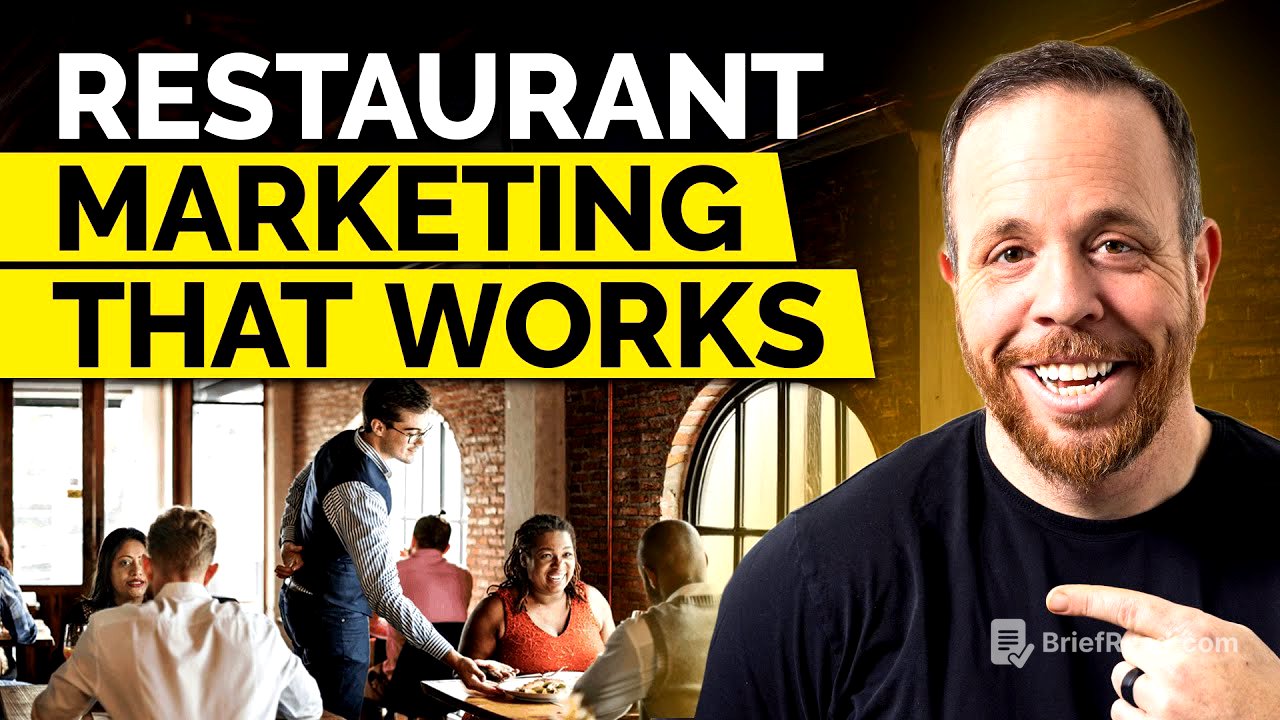TLDR;
This video outlines effective marketing strategies for restaurant owners to maximize their ROI and avoid wasting money on ineffective methods. It emphasizes optimizing digital presence, leveraging email marketing, managing online reviews, enhancing websites for online ordering, and strategically using social media. The video also covers the importance of tracking marketing spend, focusing on repeat customers, and engaging with the local community to build lasting relationships and increase revenue.
- Optimize digital presence with Google My Business.
- Use email marketing to bring existing customers back.
- Leverage online reviews and accolades.
- Enhance website for online ordering.
- Use strategic social media to get more new customers.
- Track marketing spend to produce $5 new in revenue for every dollar spent on ads.
- Focus on repeat customers through email and SMS marketing.
- Engage with the local community through partnerships and events.
Optimize Google My Business [0:00]
The most important tool for local restaurants is Google My Business. Restaurant owners should fully optimize their Google My Business profile by including all food items and ensuring the information is accurate and up-to-date. Optimizing Google My Business is essential because many customers find restaurants through Google Maps, and a complete profile increases visibility.
Restaurant Email Marketing [1:06]
Email marketing is a cheap and effective way to bring existing customers back. Restaurants can send emails about new menu items, promotions, events, and specials, especially on slower days. Modern email marketing allows for segmentation based on buying behavior, ensuring relevant content and maximizing new subscriptions while maintaining high email deliverability.
Restaurant Reviews [1:38]
Reviews are a crucial tool for restaurants. The goal is to get great reviews on autopilot by sharing awards, press mentions, and positive feedback. Replying to all reviews, especially the negative ones, helps boost the restaurant's profile in search algorithms. Training staff to encourage reviews, using QR codes on receipts, and employing apps like Ovation can automate the review process. Direct messaging should not be overlooked, as it can lead to significant catering bookings.
Restaurant Website and Online Orders [2:44]
A restaurant's website must be mobile-friendly and easy to use, featuring a proper web menu to improve search engine optimization (SEO). Restaurants should prioritize online ordering through their website to avoid high third-party delivery fees. Optimizing listings on one or two food delivery platforms and using great photos and clear descriptions can enhance the online ordering experience.
Restaurant Social Media Marketing Strategies [3:56]
Social media should be ROI-focused, aiming to attract more customers. Content should be tested and tracked, with a focus on what drives revenue. Using Instagram Reels and YouTube Shorts, along with boosted posts of proven content, can be effective. Content should be authentic and human, showcasing the restaurant's story and team. Running contests and highlighting local sourcing can also engage the audience.
Pay for Marketing Strategies You Can Track [6:00]
Restaurants should only invest in marketing strategies that can be tracked. Avoid boosting random posts without proven performance. Instead, run small, targeted ads based on creative content that has already performed well organically. Paid ads are suitable for reaching existing customers, driving traffic on slow days, promoting events, retargeting past customers, or targeting new audiences.
How to Get Restaurant Repeat Customers [7:12]
Retaining existing customers is more cost-effective than acquiring new ones. Email and SMS text marketing can be highly effective when done right. Collect contact information from all customers and use emails for weekly promos and storytelling. SMS marketing should be human-like and aim to build a relationship with customers. Loyalty programs should incentivize buying and loyalty, focusing on added value rather than just discounts.
Local Community Engagement [8:45]
Restaurants should build relationships with their local community through partnerships with other businesses, participation in local events, and support for nonprofits and local personalities. Events like fundraisers, wine tastings, and themed nights can attract press and new customers. Partnering with vendors to co-sponsor events can also reduce expenses and increase brand recognition.
Step-by-step Restaurant Marketing Plan [10:15]
A step-by-step plan to own all your marketing and stop spending money on ineffective strategies is essential for independent restaurant owners. The Unsliced Restaurant System provides a framework for achieving this, helping restaurants grow sales with effective strategies and minimum effort.









